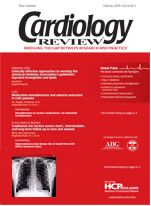Insulin associated with worse heart failure prognosis
Patients with heart failure and diabetes who require treatment with insulin have a substantially increased risk of mortality compared with nondiabetic patients with heart failure and noninsulin-treated diabetic patients with heart failure. This association between worse prognosis and insulin-treated diabetes is apparent in heart failure patients with or without coronary artery disease (CAD), according to researchers at the Ahmanson-UCLA Cardiomy-
opathy Center, Los Angeles.
As reported in the American Heart Journal (2005;149:168-174), they studied 554 consecutive patients with heart failure who were referred for heart failure management and/
or transplant evaluation for systolic dysfunction heart failure (ejection fraction of 40% or less). Three fourths of the patients (74.7%) had New York Heart Association functional class III or IV heart failure.
Of the 554 patients, 132 had diabetes, 43 of whom were treated with insulin and 89 who had noninsulin-treated diabetes. The mean follow-up time was 11.7 months, during which time there were 72 deaths. Diabetes was associated with impaired survival; at 1 year, the survival rate in diabetic patients was 78.5% compared with 89.7% in the nondiabetics (P = .002) and at 2 years, survival was 62.6% in the diabetics and 85.5% in the nondiabetic patients (P = .001).
At 1 year, survival among insulin-treated diabetic patients was 62.1% compared with 89.7% among nondiabetics (P < .001); at 2 years, survival was 57.0% and 85.5% (P < .001) among the diabetic and nondiabetic patients, respectively.
In contrast, noninsulin-treated diabetic patients had only modestly impaired survival compared with nondiabetics (85.8% versus 89.7% at 1 year; P > .05; and 66.7% versus 85.5% at 2 years; P = .035).
Even after adjusting for age, sex, history of CAD and hypertension, body mass index, serum creatinine, and ejection fraction, insulin treatment remained a significant predictor of death. On multivariate analysis, insulin-treated diabetes was associated with a greater than fourfold increase in the risk of mortality at 1 year and nearly a fivefold increase at 2 years. Noninsulin-treated diabetes was not a significant independent predictor of death at either 1 or 2 years.
Insulin treatment was associated with a worse prognosis in both men and women and in patients with or without CAD. The association between insulin treatment and poorer prognosis was unchanged when including urgent transplantation as an end point.
Previous randomized clinical trials have identified diabetes as an independent predictor of mortality in patients with heart failure, mainly in those with heart failure of ischemic origin, the authors note.
In attempting to explain the relationship between insulin treatment and adverse outcomes in patients with heart failure, they write that insulin may increase sympathetic nervous system activation, vascular resistance, cardiac and vascular hypertrophy, and endothelial dysfunction. Alternatively, use of insulin may simply be a marker for more advanced diabetes, with greater micro- and macrovascular disease and a greater degree of insulin re-sistance. In addition, oral diabetes medications may confer cardiovascular protection, they speculated, or patients who are not compliant with oral diabetes medications and are started on insulin therapy may not be compliant with heart failure therapies either.
Further investigation into the effects of individual therapies for diabetes is warranted, the authors conclude. n
